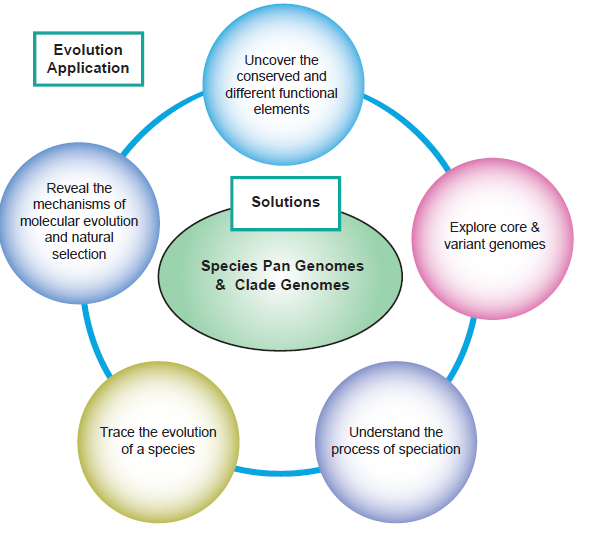
Animal / Plant

Next-generation sequencing (NGS) has revolutionized plant and animal research, allowing us to decode the whole genomes of many species. NGS also enables us to detect functional genes and markers of important traits to facilitate molecular breeding and improve agriculture production and conservation. BGI has been a pioneer in this field and is highly experienced in applying NGS to the study of plant and animal genomes, with state-of-the-art technologies and computing power, rapid turn-around time, as well as strong bioinformatics know-how. To date, BGI Tech has sequenced 656 plant and animal reference genomes, including 421 animal genomes and 235 plant genomes. In addition to genomics, BGI’s comprehensive solutions for plant and animal research include transcriptomics, epigenomcis and proteomics.
BGI offers NGS services that enable you to:
- Study evolution and diversity with de novo sequencing
- Accelerate molecular breeding with re-sequencing
Figure 1. Applications of genome sequencing for plants and animals.
Evolution and Diversity:
De novo sequencing enables you to study genomes within the same species (Species Pan Genomes) or decode genomes in the same family or genus (Clade Genomes). Population evolution based on whole-genome resequencing can be used for phylogenetic, linkage disequilibrium, genetic structure analysis, population genetic structure and species formation to explore the mechanism of biological evolution. Discovering the secret of biological evolution will explicate the origin of species and diversity of life on the earth.

Figure 2. Evolution research based on de novo sequencing.
Molecular Breeding:
Molecular breeding is applied to select the best seeds or future animals in the light of genetics knowledge of the corresponding species. DNA sequencing of domesticated and wild varieties of relevant plants or animals is crucial towards the future of molecular breeding which will then revolutionize many fields such as crops, diary and biofuel. BGI provides following advanced bioinformatics analysis of resequencing for selected breeding applications including gene/marker discovery and germplasm identification (Figure 3).
- Population Genetics Analysis
- Linkage Analysis
- HapMap Construction & GWAS
- Point Mutation Localization
- Alien Chromosome Segments Localization
Figure 3. Applications of plants and animals genome sequencing on molecular breeding.
To learn more, download the technical brochure Next Generation Sequencing in Plant and Animal Research.

